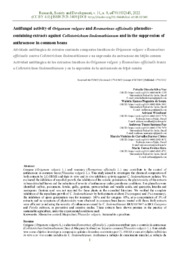Antifungal activity of Origanum vulgare and Rosmarinus officinalis phenolics- containing extracts against Colletotrichum lindemuthianum and in the suppression of anthracnose in common beans.
Antifungal activity of Origanum vulgare and Rosmarinus officinalis phenolics- containing extracts against Colletotrichum lindemuthianum and in the suppression of anthracnose in common beans.
Author(s): VAZ, P. D. da S.; SOUZA, W. R. N. de; WENDLAND, A.; PAZ, A. T. S.; CÔRTES, M. V. de C. B.; BARA, M. T. F.
Summary: Oregano (Origanum vulgaris L.) and rosemary (Rosmarinus officinalis L.) may contribute to the control of anthracnose in common bean (Phaseolus vulgaris L.). This study aimed to investigate the chemical composition of both extracts by LC-HRMS and their in vitro and in vivo inhibitory activity against C. lindemuthianum isolates. We evaluated the inhibition of mycelial growth, the inhibition of the conidia germination, the phytotoxicity of the extracts in bean detached leaves and the reduction of severity of anthracnose under greenhouse conditions. Ten phenolics were identified: caffeic, p-coumaric, ferulic, gallic, gentisic, protocatechuic and vanillic acids, and quercetin, luteolin and naringenin. Gentisic acid was not reported for these plants in the consulted literature. We verified the complete inhibition of the mycelium growth of C. lindemuthianum by both extracts at about 2% (oregano) and 3% (rosemary), the inhibition of spore germination was for rosemary: 100% and for oregano: 85%, at a concentration of 3% of extracts and no symptoms of phytotoxicity were observed in common bean leaves treated with them. Both extracts were efficient in reducing the severity of anthracnose caused by C. lindemuthianum BRM 007447 in BRS Campeiro and Perola cultivars, in preventive and curative modes. These extracts have shown promise in the practice of sustainable agriculture, under the experimental conditions used.
Publication year: 2022
Types of publication: Journal article
Unit: Embrapa Rice & Beans
Observation
Some of Embrapa's publications are published as ePub files. To read them, use or download one of the following free software options to your computer or mobile device. Android: Google Play Books; IOS: iBooks; Windows and Linux: Calibre.
Access other publications
Access the Agricultural Research Database (BDPA) to consult Embrapa's full library collection and records.
Visit Embrapa Bookstore to purchase books and other publications sold by Embrapa.

